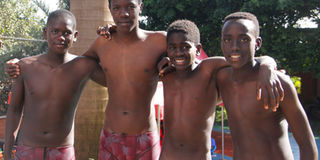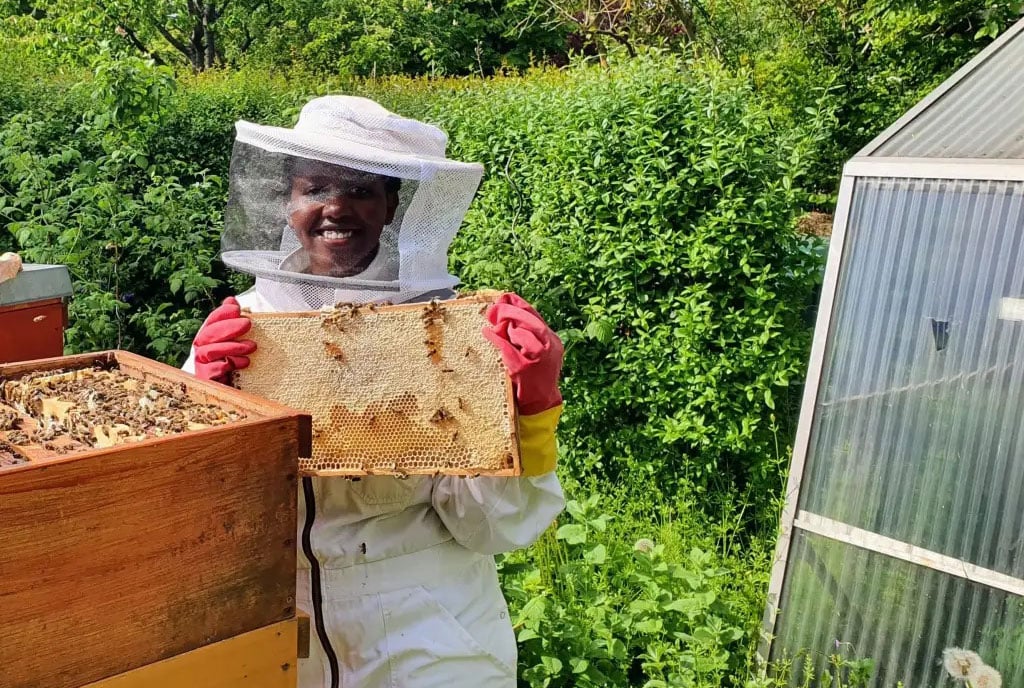Motivation key for swimming prodigies

The Future. L-R Ssamula, Kabuye, Mukalazi and Kaganda are some of the sport’s brightest prospects. PHOTO BY ISMAIL KEZAALA
As a 19-year old Joshua Ekirikubinza prepared to make his Olympic debut last year, he pondered on where those that swum better than him years ago, had disappeared to over the years.
“To be honest I wasn’t a medal winner as a kid,” said Ekirikubinza, who started swimming at six but only started thinking of the Olympics when he saw Jamila Lunkuse go to London 2012.
Ekirikubinza did not have much competition – and in a way that depicts challenges our senior swimmers have to contend with – at home to challenge his dream. His closest competitor Arnold Kisulo, was hardly in the pool in the year leading to Brazil.
Neither was Lunkuse, who showed promise at an early age earning herself an Olympic Scholarship, but she was still way ahead of other girls by then.
Lunkuse’s case is synonymous with many swimming prodigies here. Given their talent, parents and coaches have forced the young ones into a hunt for glory at age group level rather than take on a planned development programme.
“If a 10 year old brought me a medal, I would say thanks and laugh at them,” Dolphins and national coach Muzafaru Muwanguzi, told SCORE.
“Most swimmers we had winning medals at that age 10 years ago, are no longer with us yet this would be the time to give back to the country at international competitions. Most of them get to the open category and realize there are more distractions in life so they fail to cope.
“The best swimmers we have now were the guys that had less pressure to win medals as kids but focused on building technique, improving times,” he added explaining how Darren Ssamula comfortably won the 1500m freestyle at the Seals Invitational Gala on July 8.
Uganda needs to keep Ssamula’s generation that includes Dolphins teammates he was nurtured with Adnan Kabuye, Ben Kaganda, Tendo Mukalazi and others between ages 12-15. “We have to push each other hard to become better swimmers,” Kabuye offered before Ssamula added that “it is tough, but we know each other’s strong points and have coaches that understand what each of us needs to progress.” Kabuye and Mukalazi started swimming before the other two but the fine margins that separate them all are testament to their vibrancy.
“Darren and Ben have had the drive to catch up. We also do the same training, so it is easy to see why they caught up quick enough,” explained Mukalazi, who coped well on his debut in the 15 and over category at the Seals Invitational.
The quintet know they need each other to keep swimming for the long haul with Kabuye, who as of March 31 was the national record holder for the 50m backstroke (31:88) 100m back (1:10.07) and 100m individual medley (1:11.68) in his age group stressing “I want to be an Olympic legend. I want to be there by the age of like 20.” It is a big dream many before him have shared but making the grade is as much his responsibility as it is for his minders.
All four plus their closest competitors here Christian Musenze and Samora Lumonya, both 13, have represented Uganda at continental or zonal competitions and represent the future. In the same 12-15 age bracket, Uganda can also look at US-based siblings Jesse and Rebecca Ssengonzi, South Africa based twins Fadhil and Nabil Saleh and Kenya-based Ambala Atuhaire among others.
“That age is where you can make or break them,” said Silverfin coach Rosa Rodriguez, who has promising girls like Selina Katumba and Mercedes Amani. At Seals, female swimmers like Daya Yalonda Mpeera, Alexis Kituuka, Zara Nsubuga and Ssinzi Nabatanzi give as much hope as Dolphins’ Suubi Byansi, Kirabo Namutebi, Swagiah Mubiru and Hannat Nakimuli.
“It is hard to tell what they are thinking about other distractions like school and other sports. You just have to keep them motivated to keep around,” she added.
Uganda Swimming Federation (USF) president Dr Donald Rukare agrees but insists having these so many good swimmers will only be sustainable if they widen the base.
“We need to make sure the coaching is better and ensure those we have get better exposure through camps and scholarships. We have also tried to grow the base by going back to schools but we can do more,” Rukare explained.
In March, USF introduced motivational times which the swimmers can use to gauge their progress. From the chart, you can see these swimmers are a work in progress as most of their times lie between BBB and B times with Kabuye, the Salehs and Ssengonzis already hitting the A-grade in some events. “Some of them will make qualification times for international events,” said Rukare. Time will tell.
THE NUMBERS
2: Number of times Jamila Lunkuse has been to the Olympics (London 2012 and Rio 2016) – the most by any Ugandan swimmer
54: Points collected by Dolphins’ swimmer Tendo Mukalazi on his debut in the Open category at the Seals Invitational Gala. He was just eight short of topping the category won by Nuwa Senkebe.




